
kevin baggott
-
Posts
58 -
Joined
-
Last visited
Posts posted by kevin baggott
-
-
HI DH. This is coming from someone who will read five books on film chemistry vs put a friend up against a wall and throw a light on them and see what ya get. Personally besides some basic books I think yer better off grabbing a friends hd/dv camera and go out and make a short film and learn from there. See what works - what doesn't.
That said the below books have been indispensible for me.
The Five C's of Cinematography, by Joseph Mascelli
Kazan A Master Directs, by Jeff Young.
Tarkovsky;s Refelctions in Time.
And lastly I would listen to Gordon Willis's commentary for, Bright Lights, Big City.
Save Tarkovsky's book for last. The rest of the items above have been the best of hundreds of books I've read. All the best.
PS as for writing - just try and feel it and try to dip into the unconscious when you can. A writer once said that the best writers don't know what they're doing. I agree with that. They write from a deeper place. The more personal the more universal I would say. And lastly vomit it all up before you start re-writing. All first drafts are not very good. It's the re-writing that makes us look smart. And lastly don't judge the work when yer writing. And write at least five minutes every day. As Mailer said professional writers write on even the bad day. No life is too busy you can't write for five minutes. Even if you work in the coal mines you can still write five minutes. Cause if you write everyday then the voices in yer head can't bully you. "You'll never be a writer, director, etc."
Anyway - some thoughts before I've had my morning coffee.
-
Hi,
If any of you guys know abot DVD's with commentary tracks made by cinematographers, camera operators, gaffers or anybody else in that department, it would be great if you could share the names of those films. It's not very common to get hold of films with a DP's commentary. Or maybe I'm wrong.
Fred
The dvd, Big city, bright lights, has the one and only Gordon Willis doing a commentary. Enjoy....
-
It was recently brought to my attention by the talented DP and member here Stephen Murphy that Gordon Willis had done a commentary for the film: Bright Lights, Big City - which was news to me. I wish I could say it was an exaggeration on my part that I learnt more from this commentary then 4 years of film school but it's not. For those who don't know about it enjoy.
-
My mistake. I rushed my post. I wasnt clear enough.
I'm talking about the actual process of gaining employment after prison. Dealing with the social workers and counselors. The offices that deal with helping ex-cons.
All the rejection and unfair uphill battle.
The actual experience of trying to get the job. Not what its like once you already gotten the job.
Again, my mistake for not being clear.
Thanks.
Well as David said I think Straight Time is exactly all about that. Also The Yards. A good doc called Omar and Pete. Well those are the best two off the top of my head esp Straight TIme.
-
Just curious if anybody had a copy of the six dvd collection of hollywoodcamerawork's to sell. The new copy a little steep for me. Thanks - kevin
-
Go to hollywoodcamerawork.us
I found their dvds extremely helpful when trying to figure out how to cover a scene.
Hope that helps!
Going right now - thanks Ryan - kev
-
You create ground rules that will guide decisions made throughout the production, to narrow your choices down to something manageable and that gives the movie a visual structure. How rigid or obvious that structure is, or how intellectually-based, is up to you.
Sidney Pollack used to break a script's themes down to a basic conflict, let's say "ownership vs. freedom", and that theme would inform decisions made about visual design, maybe in terms of lens choice, shot size, who to cover, camera movement, etc. But obviously it's a matter of personal choice as to what the visual metaphors will be that enhances that story theme.
It's not so much that the audience has to know the first time a visual theme or symbol is presented that they know what it means -- it's really through repetition that the visual language is established -- the old rule that if it happens twice, it's a coincidence, but if it happens three times, it's a motif.
Sometimes you just need a basic concept to hang your hat on, so to speak. When I shot "Akeelah and the Bee", which for the most part is a straightforward drama, visually, not a hyper-stylized genre movie, my basic thought was that this was a character's journey towards enlightenment and knowledge, particularly self-knowledge. So to create this sense of a journey, I tried to give it a general progression from cold to warm colors, and from more mood into brightness, culminating in the final scene where the main character would be surrounded by lights. In a transitional scene in the middle, she visits a teacher in a location with warm tones and reads an inspirational quote on a wall, during which I faded up a light through the window as if the sun were coming out. This was the most stylized moment in the whole movie, when I hit that visual motif on the head, so to speak. Here are a few frames from the movie
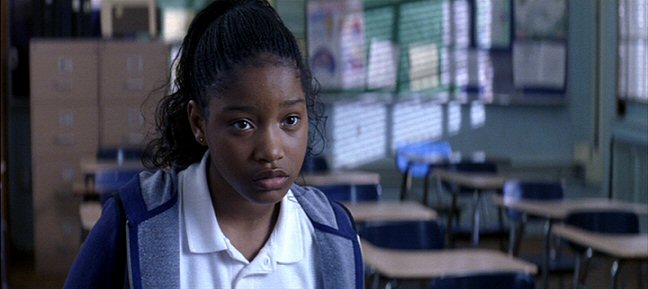
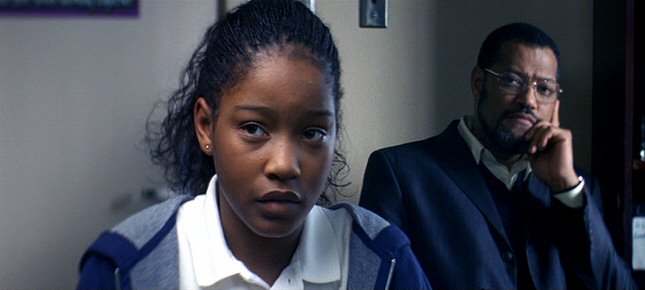
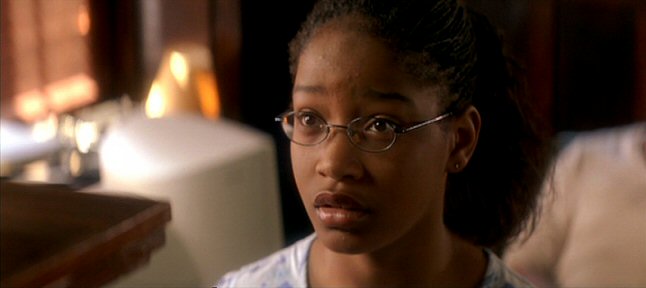
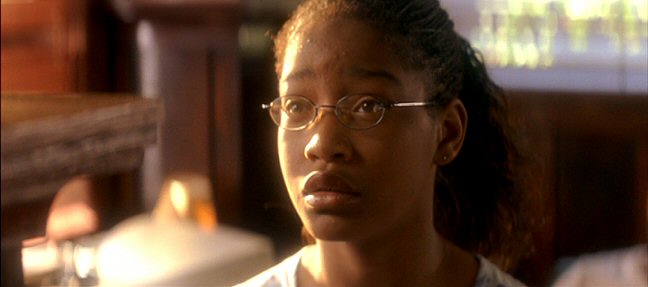
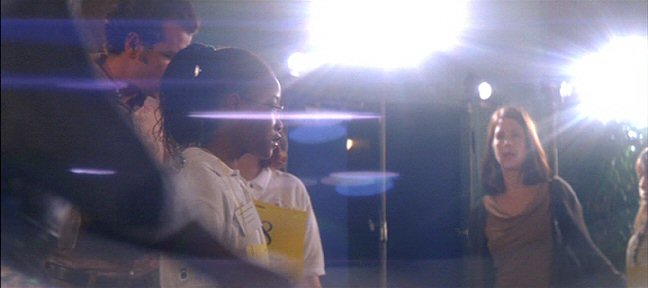
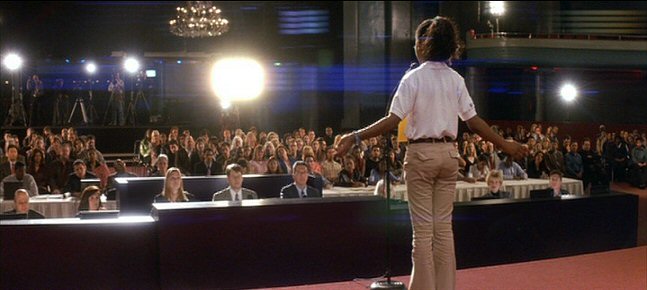
Yet as stylized as it all looks when you study it, the majority of audiences are not really aware, over the course of two hours, that there has been this visual story being told alongside the character's story.
But obviously you can make this sort of visual design even more subtle if you want. There are many times in "Akeelah" for example where we didn't stick to the color scheme progression, or where I had brighter scenes early on and darker scenes later on, etc. You still have the naturalistic elements to deal with in a script, like time of day, etc.
One key to getting away with more stylization is to build it into the script, locations, props, costumes, etc. so that the more pedantic audience members don't question it -- like wanting a green motif for a character and putting her in a green dress or putting a green neon sign out the window to get it (as in "Vertigo"). For the logic police in the audience, you've realistically motivated the symbolic effect:
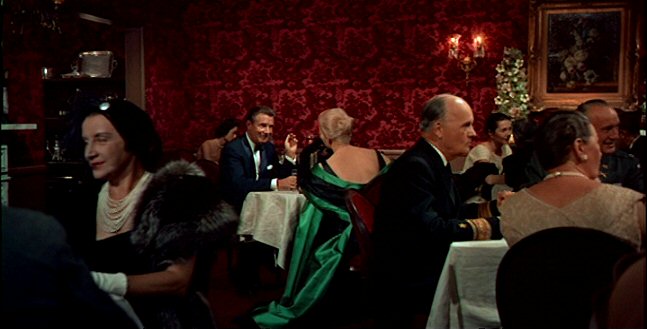
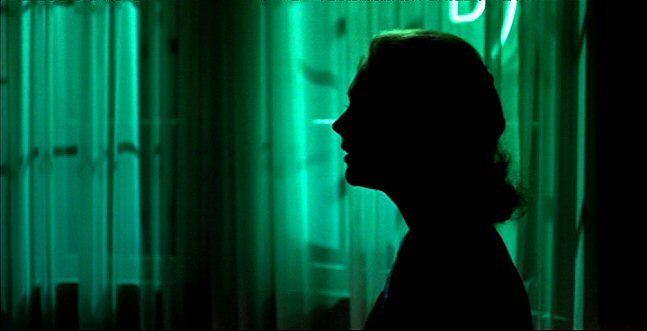
The thing is that it's all a matter of taste -- you make creative choices based on the script and you exercise personal taste in terms of how obvious you want this visual design to be. And you also understand that, unless you build everything from scratch on a soundstage, it's very hard to maintain 100% control, so in a sense, the practical reality of shooting everyday will naturally water down a strong visual design into something more subtle.
Thank you David - very generous of you with yer time and knowledge. First off thanks for the frame from Vertigo. That scene of her in the hotel all in green is still one of the most thrilling moments I've ever seen in a film.
Yeah I wonder if folks like Pollack, Lumet and Kazan broke down their films in terms of premise because of their back ground in theatre and all of them trained as actors. For it's certainly how an actor goes about breaking down a script or a theatre director.
What you say makes a lot of sense to me. Has clarified a lot of confusion I had. Thank you.
I find it so appealing the way Lumet works. He pulls that premise out of the script and nails it to his forearm. Everything in the film to the design of the credits is awash in the premise.
We writer/directors - well let me speak for myself - rarely get to work. So the hands on experience - well those muscles are not all they should be. There are two major influences I have for the visual voice of the film so far and in many ways they're polar opposites. They are Tarkovsky - for the magical inexplicability of his scenes and Gordon Willis for the elegant simplicity of his work. What I'm hoping to achieve is the poetry of Tarkovsky and the disciplined shot structure of Willis. If that makes sense. Maybe their not so different after all.
Willis would have been great working for someone like Ford - I wonder how Willis and Tarkovsky would have worked together. I want the mad inspiration of Tarkovsky's work with Willis catching it all in his exquisite composistions.
I hope I said aspire to.....
Thanks again - Kevin
-
Since you're an actor perhaps you should work from your characters' needs and how their world reflects or conflicts with those needs. Sometimes you really need to ask yourself very basic questions rather than worry about all complexities. Once you know this, you can begin to expand on your vision of the story and explain it to the DP, Art director, Costume people.
As one script editor says "the answers are already in the script, they just need to be discovered" - I think they meant rewriting and reworking the latent ideas that you've already have within the story, but you haven't yet brought forward.
Yes I hear you loud and clear Brian. Thanks champ! Kevin
-
For as many different people who might answer a question like this, there are probably that many different ways to approach it. As I've worked on projects and with various Directors over the years, it becomes apparent which have clear ideas about the story and the "look" of the project vs those who have no idea at all.
The more inexperienced and unimaginative among them settle in with the standard coverage.... and usually a lot of it. When there is no clear concept for a scene or the entire thing, a lot of standard coverage is the security blanket used so that they have something to cut later on. What's always frustrating is spending hours setting up a complicated Steadicam or crane shot only to spend the rest of the day shooting coverage that can only be used to cut it all up. It's a sign of no-confidence that the imaginative and interesting shot won't play.
Confidence in what a whole project should look like is likely the biggest element involved, but shot choice should be driven by the script itself and not necessarily anyone's "vision." Shoehorning in "cool shots" for the sake of trying to be interesting can be just as inappropriate as shooting coverage every which way til Sunday. It's really impossible to have a one-size-fits-all strategy for shooting a scene. The ultimate goal should be in finding a shot or shots which tell the story visually in a way that compliments the action and dialogue. If that HAS TO be done in multiple cuts or better plays in cuts, then lots of coverage is probably best. But if the overall style of the project and the scene itself calls for some kind of "one-er" or interesting/cool shot, then (time and budget notwithstanding) the goal should be to make that happen.
It should be all about the script and story. Not about anyone's "vision" or desire to get cool things on their reel.
Thanks a lot Brian! I really appreciate it. Very helpful. I recently wrote a feature film with a character based on John Ford. I always remember him during The Quiet Man - the scene where Wayne and O'Hara get married outside the church. He shoots one angle - W. Hoch the DP notices O'Hara looking magical in some natural light and nodges Ford to take a look. Ford says: "poop... if I shoot a close up somebody will just cut it in..."
Jesus to have that experience under one's belt makes me cry. Thanks again Brian.
I would really appreciate to hear from other folks tactics they find frustrating or rewarding in their collaborations with directors in regards to this subject - "coverage" . Thank you!
-
I want to shoot footage in cities, not for any particular project but maybe for stock footage or just to kill some boredom. It would be me, working with a very big video camera on a tripod.
But my plans have been foiled by permit fees and insurance requirements (goodbye civil freedoms, hello police state). So, I'm debating whether to pay for the permits or just shoot without any paperwork. If I buy the permits, I'll run out of money after just a couple of cities. If I shoot without permits, I might have to deal with fascist police and penalties in court.
So, what is your take on permits? Do you buy them or not?
The last film I directed was a feature and I didn't get permit one. It was a hd project with a crew of 6 and I needed to shoot in a lot of places - I'm not saying where - where I knew we wouldn't be able to get permits. Hey I was raised in NYC. This is my town! No one was going to tell me "you can't shoot here and you can't shoot there!" Screw them! All the best.
-
I'm a wrtier/director with only one feature under his belt. And a topic I alway find hard to research is how best to shoot a scene. I would just love to hear from experienced folks there preferences for shooting. Do they like to have a concept for each scene say someone like Gordon Willis does as opposed to shooting traditional coverage, ws, ls, ms, mcu, cu, ots, etc.
Thanks good peeps!
-
Hi good people. I'm a writer/director. I would really appreciate any feedback on the following question: "how do you articulate the visual voice of a feature film with your directors or by yourself?"
The problem I've been struggling with for the last couple of months is articulating for myself the visual design for a feature I will be directing in the fall. The last feature I directed I wound up playing the lead character (I'm a trained actor) so the film was more recorded then "properly mounted" as G. Willis would say.
Now the best formulation from a director that I've heard talk about this subject has been Sidney Lumet in his book. He finds his premise and from that he extrapolates the whole design of the film - his lens plot, lighting plot, shot structure, set design, costume, music, etc.
The problem I'm having folks is that I've not been able to extract a premise and I wrote the script. Now I also feel sometimes Mr. Lumet's films can be a little too schematic precisely because of this reliance on premise. For myself I really have more questions than answers in this new film. So I'm not really pushing any premises, themes, per se. I guess what I'm asking - is what other tactics have DP's used with their directors or by themselves to nail down the look of the film besides being guided by a premise? Or if you have found this to be the best way (a premise) then I would love to hear from you also.
Thank you.
-
Sent you a PM
Thanks again Stephen - kevin
-
Has anybody got this yet - are the uncut interviews long enough to warrant the double dip?
Yes I would love to know the answer to this as well. I have the original dvd - did not know about the one with the 2 extra interviews. I wish there were more interviews with Willis on the net. I've found a couple - but that's all. Just bought the book of the complete interviews from Cinematography Style - really just for a few more nuggets from Mr. Willis. Waiting a month now to recieve it from Amazon. lol.
Stephen can I ask how you did the snow in The Formorian? I thought it looked pretty good. I'm directing a feature in the fall here in NYC and have a couple of snow scenes. OF course nothing like the show that falls from above - but.... thanks - kevin
-
hi i get your point and agree with most of it
and still as you said we got to eat and pay life expenses
what i learned from over the years that it's 95% or even more A SHOW BUISNES
and maybe 5% can be called art
next month i am about to shot what people called "art" movie
which me and the director sponsored shooting with very small crew every one work free for the love of art
and yet there people how will see it and think it's junk:)
the fun part about this video was that it was a take of on "Butte" videos
Hey Ram - I'm just having a bad day - sorry if I offended you. Ignore me.... really - all the best - kevin
-
I'm prepping to shoot a build 18 RED project using the Hawk (2x) lenses - ill let you know how the workflow goes.
Speaking of The Red and Che - why is it that with every film I see projected in a theatre that was originated on HD looks dead up there? It's like a photo of a loved one. Is it the lack of grain? The image is just not organic. It doesn't breathe. It looks like marble. Is it just conditioning on my behalf having watched celluloid in theaters all these years? I know one is chemical based and one is just numbers swirling about. Even if they come up with HD with the resolution that you can see inside the pores of the actors I still feel I'll be sitting there in the theatre watching the screen vs merging with it.
-
I hear you Mike.....but you really think that the world needs MacD's/BK/etc..???
Ram, I liked your work in the video and also liked the message.
I was just left with the thought that the director could've pushed it a little bit further before the reveal.....maybe I'm wrong but that's what I felt.
This particular video made me think of some films - where you have all this gratuitous violence then the filmmakers condemn the violence at the end. Frankly filmmakers are just as responsible for the toxic imagery they put out there then the corporations dumping mercury in the ocean - what have you. I recently watched about twenty minutes of Tropic Thunder because of all the raves and after twenty minutes I had to turn it off. It was so tasteless and upsetting. And John Toll shot it. The same guy who shot Thin Red Line as people know. Well - I felt betrayed frankly. I can not take that guy serious anymore. I just can't. He's no longer an artist in my books. He used his gifts to make a buck. And hey that's his choice. "everybody has their reasons" right? Anyway - this is not a new argument. I recently saw a young band, very talented bunch of people and the lead singer was wearing a shirt that said: "willing to sell out!" After the show some friends I was with introduced me to the singer and I asked about his shirt if he meant it. "Hell yeah!" he said. It didn't make me feel good to say the least.
Macaroni and Cheese anyone?
-
:)
please do see it all the way!!
For what it's worth I'm gonna comment on this video for the sake of maybe opening a debate of some kind. So the filmmakers of this video try not to take any of this too personally. This video just happened to come into my cross hairs. It could very well have been my own work that I now address the following. I forget what poet said it, (Robert Graves?), but he said before he writes a poem, he ponders if the world really needs the poem. Imagine if we filmmakers had to ask ourselves that question every time we hit the record switch on a camera. I just remembered this question was asked by Peter Bognanovitch in a doc on him I saw years back. But the question always stayed with me. As a writer/director I really feel when I write a script what's my responsibility in bringing garbage into the world?
Over the years, I've seen my fare share of films, director's reels, DP reels, editors reels, actors reels and the absolute garbage that are on a lot of them is really a sad affair. We all say: well how are we suppose to learn our craft? We have to pay the bills! I've student loans to repay, etc. OK we can't all be Tarkovsky, etc.
I just finished watching Broadway Danny Rose for the upteen time with the sound off projected on my wall. And I don't think cinema gets any better. I don't cinematography gets any better then what's in that film. Well Willis started out shooting commercials, learning his craft. And the world is given the gift of his talents. So maybe it all evens out in the end. But I wonder....
-
Haha.
Visions of Light is great. I just ordered Cinematographer Style (which Im interested in seeing). Does anyone have any comments on it?
Not to whine.... but it would have been nice in C.S had they included some film clips or some examples of the DP's working on set . But good stuff.
-
Came across the British Cinematographer, Oliver Stapelton's site and thought it was very useful. He shot, The Shipping News, The Van, The Snapper, The Grifters, Prick Up Your Ears, etc.
-
Yeah woody said once that Willis would come to the set in the morning so angry he couldn't talk. Woody said he never got angry at him though. Yeah there's the person and then there's the work.... I can sit here at home and project his films and just marvel and don't have to worry that Willis will charge into my apt and throw a film can at me - lol.
But no doubt about it angry folks are a real problem having grown up with a couple of them.
By the way - when I was younger I snuck onto a lot of shoots here in the city. I snuck onto 2 woody films saying I was gordy's nephew - lol - I knew nobody was going to go bother him and confirm whether I was or not! lol - But I never saw him yell at anybody. HIs sets ran like clock work from what I witnessed and as you can imagine.
-
Gordon Willis had somewhat of a temper. I was talking to a guy that assisted for him on a few films. He said he was down in a ditch when Willis came over with a set of baby legs and screamed, "I SAID BABY LEGS!" Then he threw the baby legs at the assistant point first. He jumped out of the way and it barely missed him.
Yeah woody said once that Willis would come to the set in the morning so angry he couldn't talk. Woody said he never got angry at him though. Yeah there's the person and then there's the work.... I can sit here at home and project his films and just marvel and don't have to worry that Willis will charge into my apt and throw a film can at me - lol.
But no doubt about it angry folks are a real problem having grown up with a couple of them.
-
Yes I just found out from the author that it will definitely be another year - possibly two. :( But I'm thrilled to the soul it's being undertaken to begin with.
He said to me, "It's basically Gordon's film-by-film analysis of his most significant films from his own, singular perspective."
Anyway - he's a very busy guy with his day job. Possibly 'two years' I know I can wait standing on my head!
-
Thanks for the update Stephen.
By the way I would love to hear from any Cinematographers why they like Willis's work. I find it a lot of times talking about photography for it to be ineffable. Thanks.
Yes I just found out from the author that it will definitely be another year - possibly two. :( But I'm thrilled to the soul it's being undertaken to begin with.


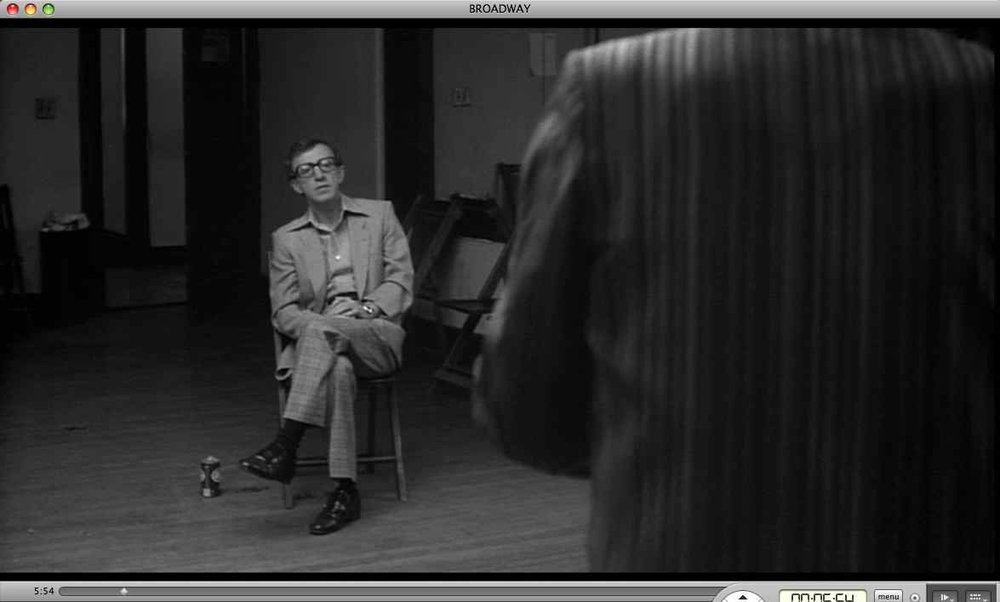
directors forum? where is it?
in General Discussion
Posted
How does one get to the "directors forum?" Sorry, I've looked everywhere. It appeared in my bolded topic line but is no longer there. Thanks folks